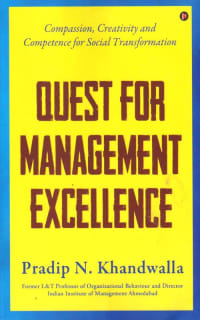Our civilization is at crossroads. It is brightened by unprecedented technological advances and blighted by murderous strife and unsustainable development. In the book “Quest for Management Excellence” by renowned management thinker Dr. Pradip N. Khandwalla argues that the way forward is through management excellence of the key institutions of society: enterprises, not-for-profits, communities, other civil society institutions, organs of the state and so forth. The book explains, with the help of numerous live examples and research findings, what management excellence means for each of these institutional forms, and how it can be harnessed to lift the quality of civilization – towards widespread humaneness, creativity and performance excellence.
The author has identified five different types of enterprise management excellence. His understanding of management excellence extended well beyond that of private sector companies to public sector corporations, NGOs, family upbringing, educational institutions, government bodies, public administration, management of democracy, management of communities and societies, and the management of civilization itself! Over time, Author says that he came to realize that management is not just business management. It is the governance principle of all collective living, and perhaps extends beyond our species to the animal and insect world as well. This story of his mental evolution is the one that he wants to tell in this book.
The synergizing of three Cs in each of the major institutional forms of society – compassion, creativity, and competence -is the key to a finer human civilization. The author’s focus is, of course, largely on India, but he suspects this revelation holds true for all human societies and all their institutions. It is this realization, and its elaboration in 17 chapters, that makes this book on management unlike any other.
The author has tried to steer clear of academic flourishes – jargon, citations, notes and so forth. Most of the chapters have drawn materials from author’s books, and any inquisitive reader will be able to find out from them the academic/research.
The book is for ‘every manager’- from the head of a family to a student of management, manager of any enterprise, NGO, government body, community leader, social leader or political leader. The tone of the book is conversational and the points illustrated are drawn from many real life examples.
All who are interested in a finer world and how to get to it would find this book worth reading.








Add comment